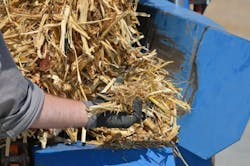New Energy Blue and ARCO/Murray Sign $650M Contract to Build Biomass Refineries and Produce SAF
New Energy Blue, a clean-energy developer, and construction firm ARCO/Murray have signed a $650 million construction contract to develop the New Energy Freedom biomass refinery designed platform across the American Midwest.
ARCO/Murray will construct the biomass refinery in Mason City, Iowa, to sustainably process corn stalks into second-generation fuel ethanol and clean lignin at large commercial capacity. The partners plan to inaugurate and start up the refinery in 2026.
The refinery is expected to create up to 500 construction jobs over 20 months. Refinery operators and feedstock suppliers from the New Energy Farmers aggregation team will hold about 70 permanent jobs with an annual payroll of $7 million.
While the economic ripple effects will likely support another 5,000 jobs, local corn growers will especially benefit from selling their excess corn stalks to the refinery and participating in profit-sharing through the New Energy Farmers business unit.
New Energy Blue and ARCO/Murray will also extend their partnership to four more New Energy biomass refineries in the next five years, clustered near the first to take advantage of the area's superabundance of corn stover. Harvesting within a 30-mile radius of each operation makes it possible to build refineries with twice the output of Freedom.
New Energy Blue CEO Thomas Corle aims to license the technical and business model to allow replacement of fossil oil and gas-refined fuels and chemicals with biomass-refined.
The partners plan to have 15 biomass refineries operating by 2030, 150 by 2040, and 500 by 2050, generating an annual total of 21 billion gallons of 2G ethanol from leftover stalks, straws, and perennial energy grasses like miscanthus.
New Energy Blue's independent life-cycle analysis has predicted that 500 refineries can keep more than 130 million tons of CO2 out of the atmosphere every year.
New Energy Blue works with two European suppliers, namely Processbio for its automated front-end bale-handling system and Valmet for the thermal reactors that cook the biomass. The cooking facilitates the release of cellulosic sugars and the extraction of clean lignin, the woody structure of the corn stalk.
The cellulosic sugars are fermented into 2G ethanol for auto fuel or downstream conversion into biochemicals. The extracted lignin is used to produce polymers and binders, serving as sustainable alternatives in road construction and replacing traditional oil and gas components in the manufacturing of eco-friendly polyesters, polyurethanes, and resins.
